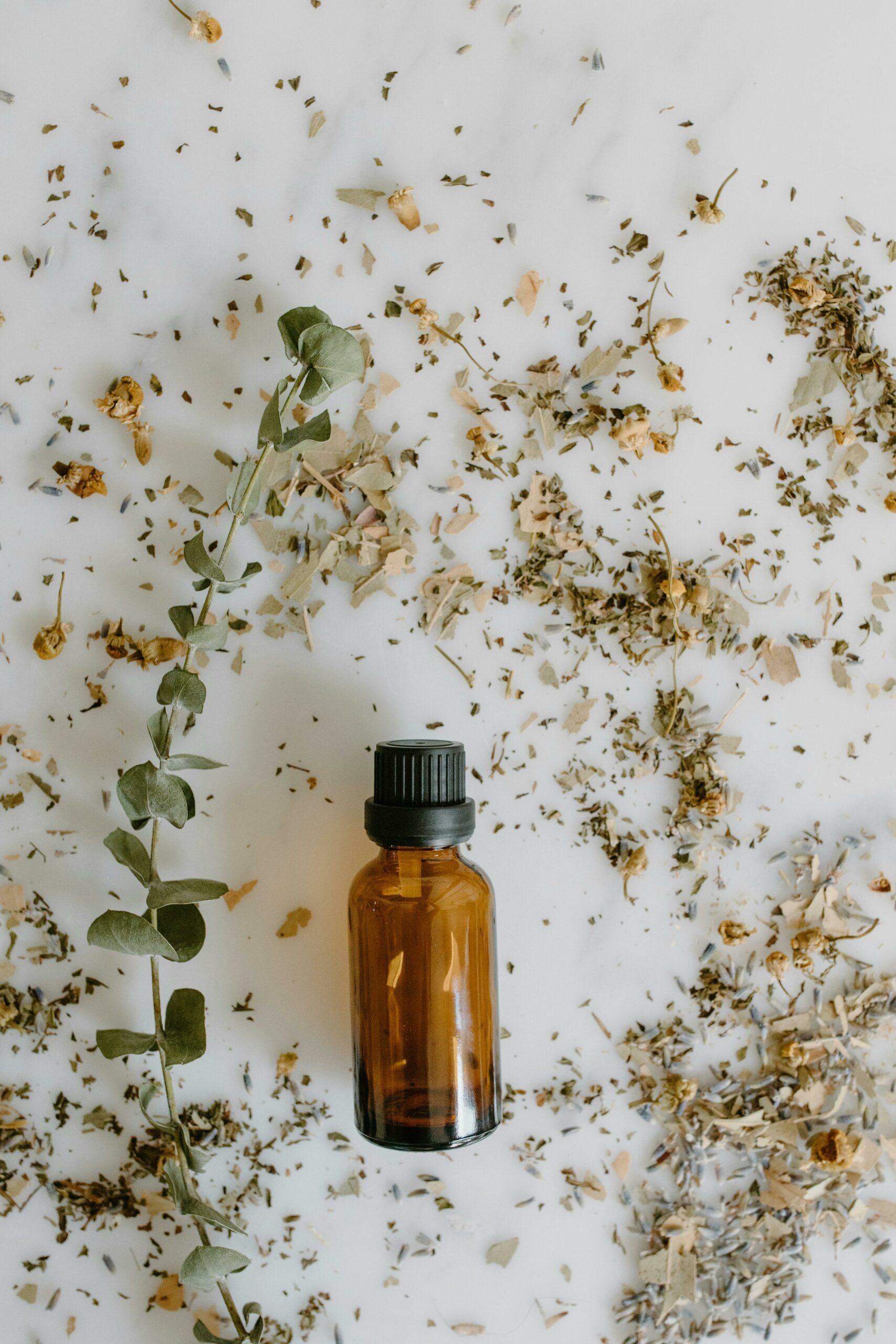The 7 Best Essential Oils For Meditation Ranked

- The Importance Of Meditation
- The Three Approaches To Meditation
- 1. The Vitamin User
- 2. The Aspirin User
- 3. The Big Life Event User
- Why Use Essential Oils With Meditation?
- What Are Essential Oils?
- How Are They Produced?
- Enhancing Your Meditation
- How To Use Essential Oils During Meditation
- 1. Aromatically
- 2. Topically
- Safety With Essential Oils
- The Essential Oils For Your Meditation
- 1. Vetiver
- 2. Lavender
- 3. Ylang Ylang
- 4. Cedarwood
- 5. Frankincense
- 6. Chamomile
- 7. Sandalwood
- Top 3 Best Meditation Apps
- 1. Headspace
- 2. Calm
- 3. Insight Timer
- Conclusion
Meditating is a simple wellness practice that can reduce stress, promote happiness, and increase focus on your mind and body. Meditation historically, as early as 5,000 BCE, has religious ties in ancient Egypt and China, as well as sizeable roots in Judaism, Hinduism, and Buddhism. The practice itself expanded globally, and today has become a widely used discipline across all cultures for various intentions. We use our minds every day but rarely do we condition our mind the way meditation does. At the core, you aren’t trying to turn off your thoughts and feelings.
Instead, you are standing along a highway just watching your thoughts drive by; recognizing, not engaging, and accepting them for what they are. Essential oils, a natural fragrance extracted from plants, can enhance your mediation sessions through the different purposes they serve. The role essential oils can play for you are soothing, toning, and grounding, while others are energizing, warming, and refreshing. Therefore, understanding the purposes of your essential oils can help to complement the purpose of your meditation that day.
The Importance Of Meditation

Meditation has multiple health benefits.
What comes with the practice of meditation is the growth of mindfulness or the idea of being present and engaged at the moment. Mindfulness meditation has repeatedly shown a positive impact on physical and mental health. These benefits include:
- Reduced Stress
- Improved Focus
- Improved Mood
- Willingness for Compassion
- Lowered Job Strain, Increased Satisfaction
- Preliminary Evidence of Reduced Symptoms of Anxiety and Depression
- Improved Quality of Sleep
- Can Help to Fight Addictions
- Helps Control Pain
For many beginners, the hardest part about meditation is the start: feeling comfortable and staying committed. People have fear and uncertainty of what the practice of meditation is. Instead, let go of any expectations and preconceived notions of what meditating is and use it as an opportunity to practice a healthy focus on your mind. Meditation is letting go of what you think you know, security, and certainty. The vulnerability of the experience will allow you to reap the benefits in your sessions.
The Three Approaches To Meditation

Meditation isn’t so linear.
At the start, beginners can find difficulty buying into meditation. You feel like if they aren’t meditating every day, then what is the point? And so a personal dilemma with yourself has started, wondering if meditation is worth the time. In The Yes Theory Podcast: The Antidote to Anxiety, hosts Matt Dajer, Ammar Kandil, and Thomas Brag invited the founder of the meditation app Headspace, Andy Puddicombe to speak on that matter. Andy expressed that there are three different approaches to meditation.
1. The Vitamin Type
Using meditation 3-4+ times a week as a normal practice to build resilience in life.
2. The Aspirin User
Using meditation when someone needs to calm the temporarily stressful or anxious mind.
3. The Big Life Event User
Using meditation when a monumental experience happens in a person’s life and they use it to better cope only for a period of time.
Meditation isn’t about relaxing the mind, but understanding a different perspective. After learning about the approaches, this practice begins to feel normal over time. You might consider yourself an Aspirin user of meditation for a period. If you have an interview, a big exam, or a difficult conversation coming up, feeling anxious is completely warranted. In that case, you can use meditation to calm the mental chatter and racing mind. Matt Dajer noted that:
“There is no silver bullet. What you are after is a combination of habits that quiet the hum. The only way you’re going to figure out what works best for you is to experiment.”
With this in mind, you can feel comforted to use meditation however you need or want to at any period in your life.
Why Use Essential Oils With Meditation?

Essential oils are diverse.
What Are Essential Oils?
Essential oils are natural compounds extracted from plants, capturing their unique scent and flavor. Across the board, essential oils bear many health benefits from skincare within products to aromatic stress relief. Essential oils also range in quality based on how brands extract the oils, the plants they come from, or packaging and storing.
How Are They Produced?
The difference in extraction methods is better suited for certain plant types. One of the most popular methods is steam distillation, where the steam vaporizes and isolates the volatile oils in the plant for use in natural products.
The next method is solvent extraction where food-grade solvents (hexane and ethanol) are used to isolate the essential oils in plants with low amounts of the liquids. This method produces a more fine fragrance than other distillation methods.
Lastly, maceration oils, or infused oils, when carrier oils (An oil with little or no scent to dilute or “carry” essential oils) are used as solvents to capture more of the plant’s essence in the oil.
Enhancing Your Meditation
Essential oils are useful for many purposes including stress relief, mood boost, pain relief (headaches, migraines), sleep, and nausea. Additionally, beyond those uses, essential oils can enhance your meditation sessions. In her podcast, health and wellness practitioner Jennifer Pansa talks about how essential oils could benefit your practice of meditation. Pansa talks about the use of oils in meditation being able to slow you down. Essential oils can act as natural sedatives, enhancing the relaxed state of meditation.
How To Use Essential Oils During Meditation
Aromatically
The aromatic use of essential oils is the most commonly used method of application. The reason for this is how strong our sense of smell is interconnected with our physiological, emotional, and mental responses. Diffusing is one of the simplest ways to use essential oils aromatically. Without an oil diffuser, you can still achieve the same goal by spraying the mist of oil on furniture, adding the oil to laundry, or even leaving a cotton ball with oil in the corner of the room.
Topically
Applying essential oils to the skin is another popularly used method because of how easy the oils penetrate the skin. You can apply the oils to most parts of your body, but it is important to be careful of sensitive skin (some facial areas, eyes, inner ears, open wounds). The few beneficial areas to apply the oils are the neck, the forehead and temples, chest and abdomen, arms, legs, and the bottom of the feet.
Safety With Essential Oils
When applying essential oils with any approach, there are safety guidelines to follow. These guidelines include:
- Avoid sensitive areas of the skin, especially with “hot” oils
- Always read the packaging and instructions on an essential oil
- Use dilution to minimize skin sensitivity
- Be aware of oils that have sun sensitivity warnings
- Store safely — keep out of reach from children
The Essential Oils For Your Meditation

The floral scent of lavender is one of the more versatile essential oil aromas.
1. Vetiver
Vetiver is one of the best essential oils for meditation. Because of the grounding properties, aromatherapists rank vetiver very highly. This oil holds a very rich, earthy aroma that fosters a peaceful environment to meditate with. Experts suggest placing a few drops in the palm of your hand and inhaling deeply for the full effect. Vetiver has plenty of health benefits such as antiseptic, antispasmodic, and a sedative for the nervous system, to name a few. Using vetiver as a base note for a blend of other essential oils is one of the more common applications.
2. Lavender
The floral scent of lavender is one of the more versatile essential oil aromas. Lavender has always been used to deal with stress and anxiety, making this one of the more popular oils for meditation. Lavender balances the body, calms the mind, creating an environment of clarity for a meditative state. With a relaxing and calming aroma, lavender can be added to your sleep meditation practices, as well.
3. Ylang Ylang
Ylang-Ylang is less of a relaxed-smelling oil and more of a foreign aroma. However, this oil happens to be one of the best for mediation. When used in reduced amounts (1-2 drops), ylang-ylang can lessen anxiety and relax the mind because of the potent smell. Even with the strong scent, ylang-ylang can still enhance both your blend and your meditation experience.
4. Cedarwood
Cedarwood, an aroma used in many personal fragrance products, has been applied for years because of its therapeutic benefits. With an earthy scent, cedarwood can balance mood and play a sedative role with its soothing qualities.
5. Frankincense
Frankincense has long been used for medicinal and meditative practices. The therapeutic properties are why Frankincense is a great oil for meditation. Some of these properties include skin benefits, respiratory health, and ease of the mind. The improved lung capacity also plays into benefiting your meditation.
6. Chamomile
Chamomile is a smart choice of oil for a nighttime wind-down meditation because of its stress-relieving and rest-encouraging properties. It can stand alone, with a fruity aroma to give you quality sleep, but Chamomile can also be blended nicely with other aromas like lavender, ylang-ylang, or clary sage.
7. Sandalwood
The aroma of sandalwood has positive effects on the mind directly connected to alertness and attentiveness. When meditating, sandalwood can increase your focus on the breath, your body, and your mind, enhancing your sessions. Research also suggests that sandalwood can reduce anxiety, which is why meditation users prefer the use of this oil.
Top 3 Best Meditation Apps
To begin healthy meditation practices, there are plenty of helpful apps to supplement your sessions anywhere and at any time.
1. Headspace

Headspace is one of the most popular meditation apps, offering both guided and unguided meditations for all different situations and activities. From basic meditation, a break from work, your morning walk, yoga, and even countless sleep categories, Headspace provides you with a sense of presence to help calm the busy mind. The free version of the app offers basic courses and mindfulness sessions for beginners.
Headspace Plus: $12.99 a month with a 7-day free trial or 14 days free with a $69.99 annual subscription
2. Calm

Calm is an award-winning mindfulness app that features hundreds of exercises, breathing techniques, and narrated sleep stories. The meditation section of the app is categorized as ‘stress’, ‘focus’, ‘anxiety’, ‘relationships’, etc. Ultimately, Calm has the goal of Mindfulness-Based Stress Reduction (MBSR) to calm the stressful and anxious mind.
Calm Premium: $14.99 a month, $69.99 a year, or a lifetime membership for $399.99
3. Insight Timer

Insight timer is a completely free app that provides the most freedom to choose your meditation. With over 70,000 guided or unguided meditations, users enjoy the freedom of picking how long to practice, what style, or just setting a timer and sitting.
Conclusion
The use of meditation can only contribute to many different facets of your life. You can enhance your career with increased focus, creativity, and understanding of new perspectives. Additionally, you can improve relationships by letting meditation encourage positivity, curb your stress, and keep you grateful and connected. When you begin to become more familiar with this practice, opening up to the use of essential oils will only enhance your meditation experience. Using essential oils for the same purposes outside of meditation can also become a new routine practice. Opening up to the addition of these small-scale practices in your life can pose larger impacts in the future, near or far.


